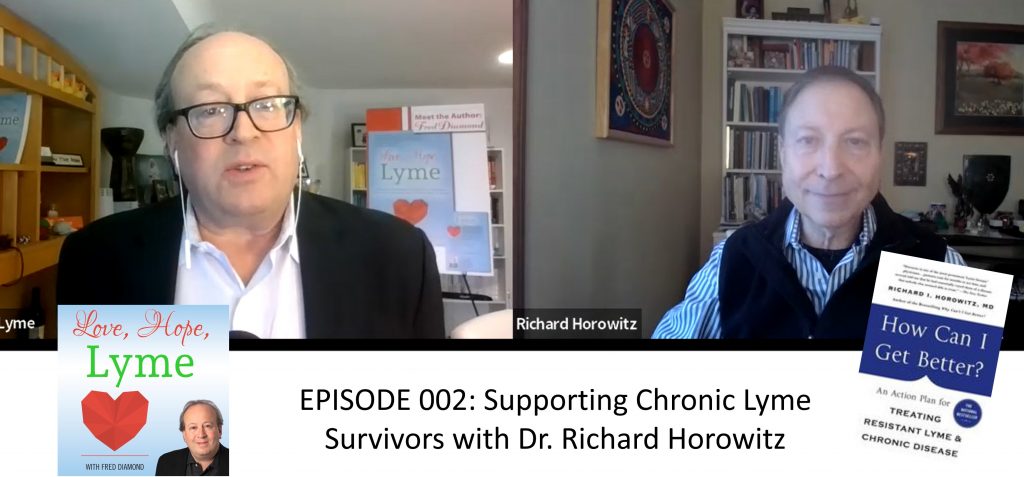Inaugural “Love, Hope, Lyme” podcast features Dr. Richard Horowitz

by Fred Diamond
In my inaugural episode of the “Love, Hope, Lyme” podcast, I interviewed Dr. Richard Horowitz, author of “How Can I Get Better? An Action Plan for Treating Resistant Lyme & Chronic Disease.”
Horowitz has been treating Lyme patients for over 40 years and was most recently featured in “The Quiet Epidemic” documentary. I’m grateful that he wrote the foreword to my book, “Love, Hope, Lyme: What Family Members, Partners, and Friends Who Love a Chronic Lyme Survivor Need to Know.”
I launched this podcast to delve deeper into the topics covered in my book,
If someone in your life has Lyme disease, I want to help you understand what your loved one is dealing with. If you have Lyme yourself, I want to help you learn ways to better ask for the support you need.
New episodes will be posted every other Monday at 9 a.m. Eastern Time on Apple and wherever you get your podcasts. Upcoming shows will feature insights from some of the top medical practitioners, community builders, and patient advocates in the Lyme world.
What Should Those Who Love a Chronic Lyme Survivor Expect?
I asked Dr. Horowitz what those who love a chronic Lyme survivor need to know. His reply: “The most important thing is that it’s a real illness. It’s not in their head. A lot of Lyme patients have gone to 10, 20, 30 doctors. The most I’ve ever seen was someone who went to 100 physicians before seeing me.”
Horowitz said this is primarily because the general medical community still is confused as far as the diagnosis and treatment of this very difficult disease.
“You need to know that your loved ones are going to have good days and bad days with ups and downs,” he said. “You have to get used to the idea that this is going to be a roller coaster ride. It’s a long process and it takes time to unravel the illness to address other of these abnormalities (co-infections), whether they also have Babesia, Bartonella.”
When asked what advice he would give those who want to support their loved one, he said people need to be patient and have compassion because, in fact, solutions do exist.
“We’re coming up with better solutions pretty much every year, as we’re discovering new treatments for Lyme.”
Horowitz said he devoted his career 40 years ago to treating Lyme patients when he realized what an epidemic it was.
“There was a need for patients who were suffering. When I was finishing medical school, I asked one of my spiritual advisors what was the most important thing he wanted me to know, and he said – Compassion – put yourself in people’s shoes and do for them which you would want done for you.”
The Best Thing to Do is Listen and Have Empathy
“The best thing to do is listen to your loved one and have empathy because it’s very difficult to put yourself in someone’s shoes when they don’t necessarily look ill. They may look fine, but they’re chronically tired. They can barely get out of bed. They have terrible brain fog and aches and pains all over their body. Put aside your prejudices. Just listen very carefully, with an open mind, and figure out, how can I help?”
Horowitz said the most difficult thing for someone who is living with someone who’s ill is to try and create a process or a framework for them to follow. Saying things such as “Baby, you must get out of bed today. You got to go to work. You’ve got to exercise” may not work for them. Your support must be in sync with what your loved one’s health care practitioner recommends, and what they have decided they are capable of doing.
“Ask what are they capable of doing? Where should I push and where can I put a gentle hand in your back?”
He also recommended that you take care of yourself, too. “You must find your own way, to find balance in your life where you have your own love and fulfillment. Sometimes in life we’re going to be giving to others more than we’re going to be getting back. You need to keep an open mind and look at the big picture that it’s going to take a while to get over this illness.”
The Role of Childhood Trauma
When asked how important resolving childhood trauma is to recovery, he said, “Most of the patients that I see who are chronically ill have had childhood trauma. Depending on the type of trauma, whether it’s physical, emotional, or sexual abuse, you’ve got to dive down because the people who really are the most difficult people to treat in my practice are the ones that have very severe depression, very severe anxiety, and a lot of times it’s from that trauma that is just unresolved. It’s an essential part of the equation because of the way the mind body works.”
When asked for his final thoughts, Horowitz said, “Learn how you can support someone who’s ill. I’ve found that the greatest happiness I have is when other people are happy and healthy. You’ll find that when you’re a provider taking care of someone who’s ill and they do get better and you’ve played an important role, it’s really something that kind of fills your heart with fulfillment, and it’s so important both for yourself and for your loved ones.”
Click here to listen to all episodes of the Love, Hope, Lyme Podcast.
Fred Diamond is based in Fairfax, VA and can be contacted via Facebook. His book, “Love, Hope, Lyme: What Family Members, Partners, and Friends Who Love a Chronic Lyme Survivor Need to Know” is available on Amazon. The e-version of the book is free to Lyme survivors. Reach out to Fred on Facebook for your copy.





















We invite you to comment on our Facebook page.
Visit LymeDisease.org Facebook Page